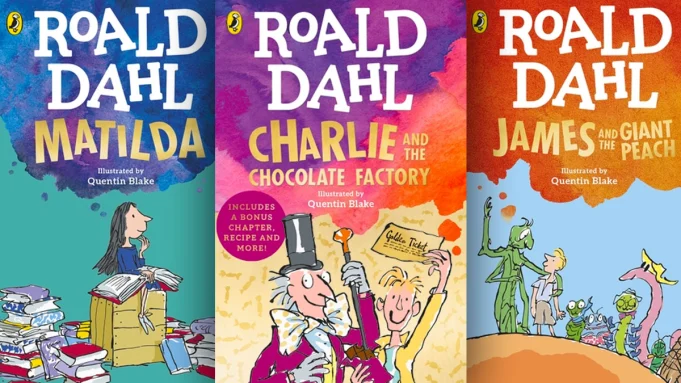The estate of Roald Dahl this month announced that it would be rewriting many of the long-dead author’s books to better suit a “modern” audience. Translation: The books will be rewritten so the text is more in line with the editors’ notions of politically correct language.
As a parent of four children, I’ve read my share of Roald Dahl books over the years, although I wouldn’t consider myself an especially big fan. Yet it’s hard to imagine what is so “offensive” in a Roald Dahl book that it needs to be rewritten. The Dahl books are not comparable to the original editions of, say, the Nancy Drew novels, whose depictions of the Drews’s black housekeeper contain a number of eyebrow-raising stereotypes.
No, it seems Dahl’s main offenses consist of crimes against modern orthodoxies about “nonbinary” gender rhetoric and related terms. For instance, as one British news service notes:
References to “female” characters have disappeared, as evidenced by Miss Trunchbull in Matilda, who is now referred to as a “most formidable woman”, having previously been “most formidable female”.
“Boys and girls” has been replaced by “children”, while The Cloud-Men in James and the Giant Peach have become Cloud-People, while Fantastic Mr Fox’s three sons have become daughters. . . .
Passages not written by Dahl have also been added, as evidenced by The Witches, where a paragraph that explains that witches are bald beneath their wigs ending with the new line: “There are plenty of other reasons why women might wear wigs and there is certainly nothing wrong with that.”
We’re also told that
Augustus Gloop, Charlie’s gluttonous antagonist in “Charlie and the Chocolate Factory,” which originally was published in 1964, is no longer “enormously fat,” just “enormous.” In the new edition of “Witches,” a supernatural female posing as an ordinary woman may be working as a “top scientist or running a business” instead of as a “cashier in a supermarket or typing letters for a businessman.”
The word “black” was removed from the description of the terrible tractors in 1970s “The Fabulous Mr. Fox.” The machines are now simply “murderous, brutal-looking monsters.”
(We’re now hearing that Ian Fleming’s James Bond novels are being “reviewed” for possible rewriting as well.)
This isn’t a new idea, of course. Mark Twain’s Adventures of Huckleberry Finn has already been rewritten. But there’s a key difference between Twain’s works and Dahl’s works. The text of Dahl’s books remains firmly under the control of Dahl’s estate and the corporations that have bought the “rights” to use the texts. Twain’s works, on the other hand, are in the public domain. (But this doesn’t stop legions of Mark Twain Project lawyers from claiming that the works are still copyrighted.)
That is, the law states anybody can read or reproduce the original text of Huckleberry Finn for free. Here’s an intact copy of the not-rewritten text. So, even if someone rewrites the book, anyone can access the old version of it with ease and at low cost.
That’s not so with works that are still protected by copyright. Thanks to copyright laws, the estate of Dahl can not only rewrite the books, but can also essentially outlaw the old versions. Yes, the old originals will persist in secondhand versions, but over time, these will become prohibitively expensive for casual readers and the new “corrected” versions will become the only ones available.
What’s more, now that Dahl is safely dead, there’s no danger of his objecting to having some corporate editor rewrite his books for the purposes of yet another cash grab by his heirs and the hack writers working on the latest Netflix adaptation.
This is all happening thanks to the invented, artificial, and dubious legal concept of “intellectual property.” Now even the works of creators that have been dead for decades continue to be controlled by heirs with a government-created monopoly over the use of a particular combination of words. In the case of Dahl’s books, copyright protects this monopoly for whoever “owns” Dahl’s texts, and this means that if parents want new and affordable copies of Dahl’s books, they will only be able to get what the monopolists say they can get. This has proven to be extremely lucrative, by the way.
It’s only thanks to a backlash over the proposed rewriting of Dahl’s books that the old texts remain available at all (for now). After countless complaints, the publisher recently announced it will issue “both” versions of the books. It’s extremely likely, however, that this is only a short-term measure and that once the critics of the rewrites pipe down, the publisher will eliminate the old versions altogether. Nor is there any end in sight to this sort of thing. Thanks to current US copyright law, monopoly protections over a text remain in effect for seventy years after the author’s death. This term is a massive expansion from the fourteen-year protection established by the US Constitution. The length of copyright protections after the author’s death is purely arbitrary and a good indicator of how the whole concept is just a matter of made-up monopoly power that doesn’t reflect any actual property rights based in natural law. Thanks to countless renewals, it will be several more decades until the US copyrights on Dahl’s works expire, assuming Congress does not extend the standard length of copyright protections yet again.
This article was originally featured at the Ludwig von Mises Institute and is republished with permission.







